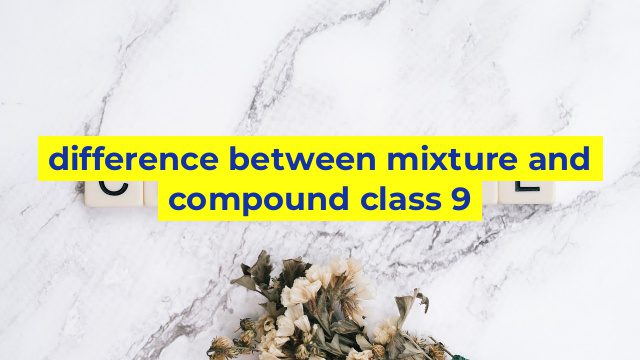The Basic Difference Between Mixture and Compound Class 9 Explained
When we talk about matter, it can be classified into two broad categories- pure substances and mixtures. Pure substances are those materials that contain only one type of particle or molecule. On the other hand, a mixture is a material that has two or more substances, physically mixed together. A mixture can further be categorized into homogeneous and heterogeneous mixtures. Homogeneous mixtures are uniform in composition while heterogeneous mixtures are not.
A compound, on the other hand, is a pure substance that is made up of two or more different elements chemically combined in a fixed ratio. In class 9, you must have learned about the basic differences between mixtures and compounds. Here, we will dive deeper and discuss the specific differences between these two categories.
Composition
The primary difference between mixtures and compounds lies in their composition. Mixtures have a variable composition, meaning that they can contain different proportions of each substance mixed together. In contrast, compounds have a fixed composition as they are made up of two or more elements that are chemically bonded in a specific ratio.
Separation
Another critical difference between mixtures and compounds is their separation process. Mixtures can be separated using physical methods such as filtration, distillation, and chromatography. On the other hand, compounds can only be separated using chemical methods, such as reduction or oxidation, which break the chemical bonds between the elements.
Properties
The properties of mixtures and compounds also differ from each other. Mixtures have variable properties depending on the proportions of each substance present in the mixture. In contrast, compounds have unique properties different from that of their constituent elements. For example, water, a compound made up of hydrogen and oxygen, has unique properties such as boiling and freezing points that are different from those of its constituent elements.
Conclusion
In conclusion, mixtures and compounds are two different categories of material with distinct differences in their composition, separation process, and properties. As a class 9 student, it is crucial to understand these differences to have a clear understanding of the types of matter around us. Whether it is a mixture or a compound, each has its unique properties and applications that make them an essential aspect of our everyday lives.
Table difference between mixture and compound class 9
Difference between Mixture and Compound
| Property | Mixture | Compound |
|---|---|---|
| Definition | A combination of two or more substances that are not chemically bonded together | A combination of two or more elements that are chemically bonded together in a fixed ratio |
| Composition | Variable and can be separated by physical means | Fixed and cannot be separated by physical means |
| Properties | Retains the properties of its constituents | Has unique properties different from its constituents |
| Examples | Air, soil, sugar and water, salt and sand mixture | Water, carbon dioxide, sodium chloride, methane |
| Chemical Change | No chemical change occurs | Chemical change occurs |
